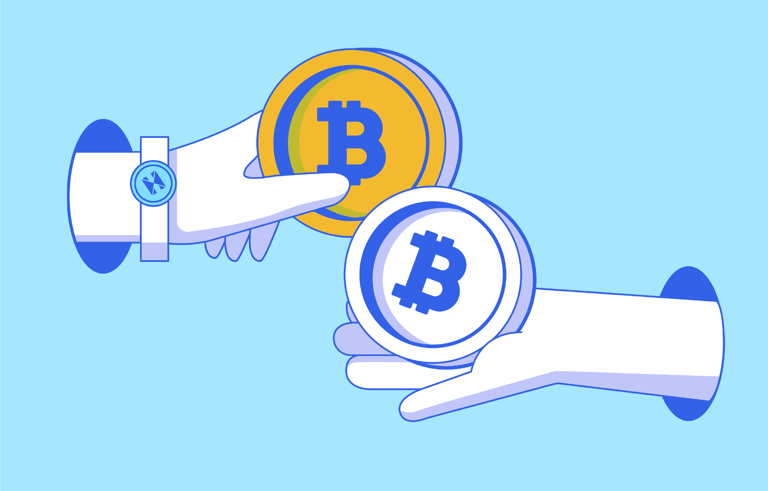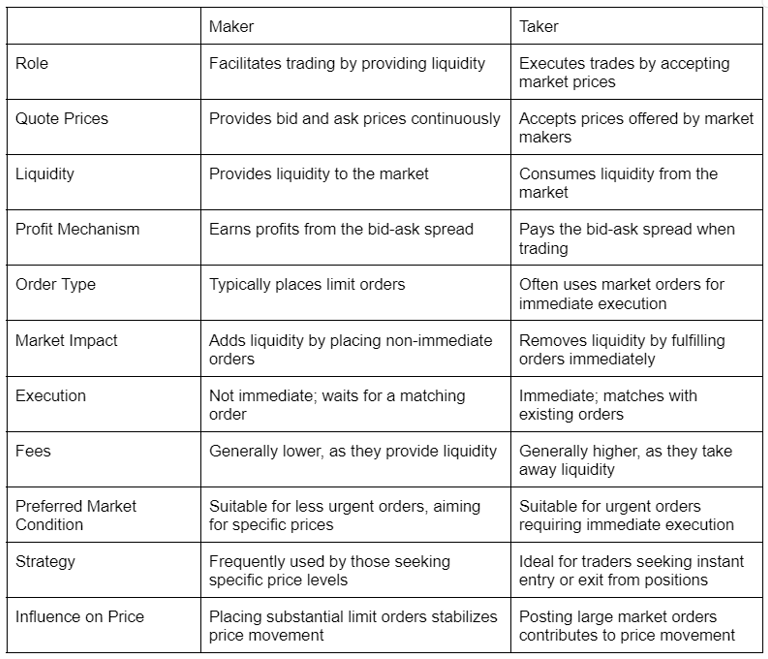Market Maker vs. Market Taker: What's the Difference and Why It Matters?
In the world of financial markets, there are two main players: the market maker and the market taker. Both are important for making trades happen, but it's crucial to know the difference between them if you're an investor or trader. So, what makes them different, and why does it matter? Let's explore to get a clear picture.
What is a Market Maker?
What exactly is a Market Maker and what role do they play? In cryptocurrency, a Market Maker is any participant in the market who helps maintain liquidity by placing Limit orders. These orders aren't executed immediately; instead, they remain in the order book until matched by another order, effectively "making" the market.
Market makers typically consist of traders with significant capital. They create a multitude of Limit buy and sell orders for a specific trading pair. By profiting from the price spread between buying and selling assets, market makers provide liquidity to exchanges, which in turn facilitates fast trade executions for retail traders.
Examples of Market Makers
Major financial institutions, such as brokerage firms, often function as market makers. In the cryptocurrency space, trading platforms and algorithmic trading firms play a significant role in this space , acting as high-frequency market makers. These entities leverage advanced technology and sophisticated trading algorithms to provide liquidity and execute trades swiftly and profitably.
What Is a Market Taker?
What exactly is meant by a "market taker"? Market takers are traders or investors who withdraw liquidity from the market by placing orders that get executed right away, like Market orders. Essentially, they're taking liquidity from the market as the exchange fulfills their orders at current market prices from the order book.
It's worth noting that significant market orders from takers can have a notable impact on cryptocurrency prices. When large amounts of cryptocurrency are involved in Market orders, they absorb liquidity. If there isn't enough liquidity, prices can quickly fluctuate depending on the direction of the transaction.
Types of Market Takers
Market takers come in various forms, each with its own unique characteristics and objectives:
Retail Traders: Individual investors who trade securities for personal accounts.
Institutional Investors: Large organizations, such as pension funds and mutual funds, managing substantial sums of money on behalf of clients.
Hedge Funds: Alternative investment vehicles employing sophisticated strategies to generate alpha and manage risk.
Proprietary Trading Firms: Trading firms that use their capital to trade financial instruments for profit.
Difference between Maker and Taker
Why do cryptocurrency exchanges adopt a Maker/Taker system?
Cryptocurrency exchanges use a Maker/Taker model to balance liquidity and encourage market makers to add liquidity, making Limit orders more beneficial for trading. This system ensures that both makers and takers can engage in trading under favorable conditions, which helps stabilize asset prices and maintain market dynamics.
Why Does It Matters?
Understanding the disparity between market makers and market takers is paramount for traders looking to navigate the financial markets effectively. Here's why it matters:
Price Impact: Market makers and market takers have contrasting effects on prices. Market makers help stabilize prices by providing liquidity, while market takers can contribute to price fluctuations, especially when large market orders are executed.
Trading Costs: For traders, the choice between being a market maker or a market taker can have cost implications. Market takers may incur higher trading costs due to paying the spread, whereas market makers can profit from capturing the spread.
Strategy Development: Knowledge of market maker and market taker dynamics can inform traders' strategy development. Understanding how liquidity providers and liquidity consumers interact can help traders devise strategies to capitalize on market inefficiencies and optimize trade execution.
Scenarios in Crypto Markets
Imagine you're at a cryptocurrency exchange. Let's say you want to buy some Bitcoin. You place an order to buy 1 Bitcoin at the current market price. In this scenario:
Market Maker: If someone else has previously placed an order to sell Bitcoin at a specific price, and your order matches with theirs, they are the market maker. They have set the price at which they are willing to sell Bitcoin, and you're accepting that price. They provided liquidity to the market by offering their Bitcoin for sale.
Market Taker: You, in this case, are the market taker. You're accepting the price set by the market maker and taking their offer. You're essentially "taking" liquidity from the market by executing your buy order at the price offered by the market maker.
Conclusion
To wrap up, knowing the difference between market makers and takers is super important in finance, especially in crypto trading. Market makers keep things stable by offering liquidity, while takers grab liquidity and can shake up prices. Crypto exchanges use a system to balance these roles. Understanding if you're a maker or taker is key for traders because it affects prices, costs, and strategies. Overall, it's a big deal in finance and shapes how people trade and invest.
DISCLAIMER & WARNING
The information provided here is presented "as is'' and is intended for general informational and educational purposes only. It does not come with any representation or warranty of any kind. This content should not be interpreted as financial, legal, or other professional advice, and it is not intended to endorse or recommend the purchase of any specific product or service. It is advisable to consult with appropriate professional advisors for personalised guidance. In cases where the article is contributed by a third-party author, please note that the expressed views belong to the author alone and may not necessarily reflect the opinions of Hata. For furthedetails, we encourage you to read our complete disclaimer. Please be aware that the prices of digital assets can be highly volatile. The value of your investment may increase or decrease, and there is a risk that you may not recover the full amount invested. You are solely responsible for making your own investment decisions, and Hata cannot be held liable for any losses you may incur. This material is not to be construed as financial, legal, or other professional advice. For more information, please refer to Hata’s Terms of Use and Risk Warning.




